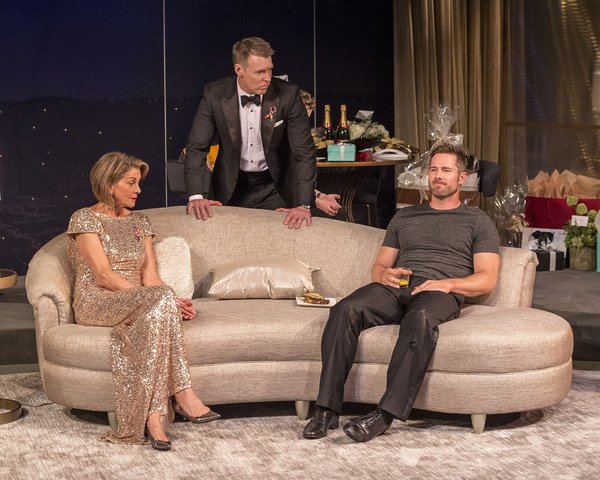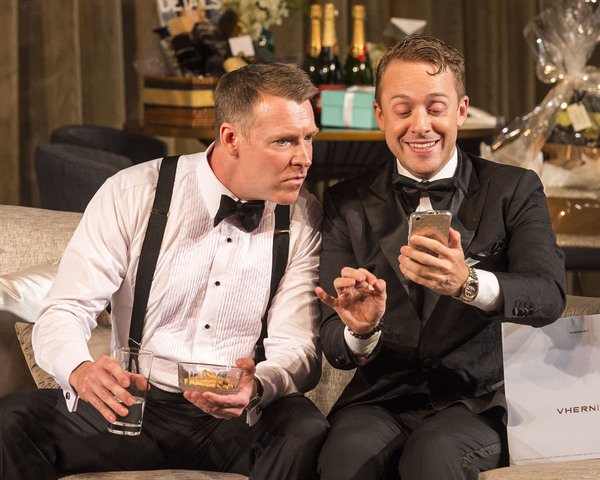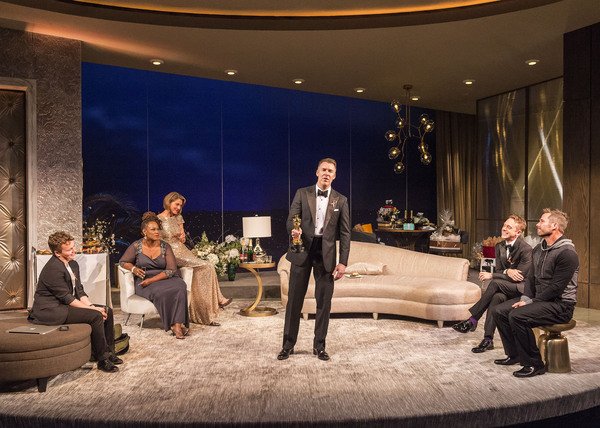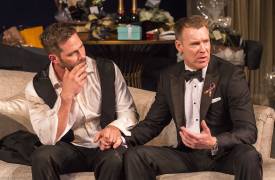
We here at Horror Fuel have been tracking Rock Paper Dead since back in 2015. The film was written by Kerry Fleming and Victor Miller (Friday the 13th), directed by Tom Holland (Child’s Play), and produced by Fleming and Amy Williams. After interviewing both Fleming and Miller, we could not wait to see the final film. That day has finally come. Earlier today, I sat back and pushed play with my fingers crossed that the film would be everything I had hoped for. Luckily, it was.
In the beginning of the film, we witness Peter Harris (Luke Macfarlane) execute a woman he has kidnapped just as the police bust down his door. The girl’s identity will play a major part in the film later on. After serving time at a psychiatric hospital he is deemed cured by Dr. Evelyn Bauer (Tatum O’Neal) and released. However, the arresting officer Doyle Dechert, played by Micahel Madsen, is not convinced Peter is actually cured and sets out to keep an eye on him.

When Ashley (Jennifer Titus) moves next door (on purpose) Dechert explains to her that Peter is dangerous. While she claims to be a reporter seeking to write a book about Peter, that’s far from who she truly is. In reality, she is the sister of Peter’s last victim before being put away and she’s hell-bent on revenge. Ashley has spent her life training to go toe-to-toe with the killer and avenge her sister’s death.
After Peter agrees to let her write the book the two begin to spend a lot of time together much to the chagrin of detective Dechert. The more time they spend together the more a strange attraction/hatred develops between the two. Peter’s urges grow to slip on that doll mask and sharpen his blade.

During his last writing sessions with Ashley, the truth of Peter’s tormented past comes out. It is revealed that he began life as a normal child before being sent to live with his uncle Charles (John Dugan). We witness the pain and damage inflicted by Charles in flashbacks. When it comes to the question of nature vs. nurture, the film implies that Peter’s sickness is mostly due to the way he was raised and his experiences, though nature does play an important part as well.
Peter could no longer fight the urge and attacked Ashley. This is where I swear not spoil the ending and trust me, you don’t want me too.

I will say this, don’t piss off actress Jennifer Titus (Zoombies) (interview). She’s a badass. In all seriousness though, she was great as Ashley. She captured the anger her character felt for Peter perfectly. The fact that her role was so physical and knowing the fact that she was acting and fighting just weeks after major shoulder surgery left me with a new respect for her as an actress.
Mcfarlane truly shines. He plays crazy so very well. You could tell the character was “off” but Mcfarlane never goes overboard like so many actors do. His character Peter came across both sick and sympathetic which was a strange feeling. He is a killer after all. Luke was fantastic. A new horror icon is born.

The scenes with Uncle Charles (John Dugan) left me feeling gross, but that’s not a bad thing. The definition of horror is: “an intense feeling of fear, shock or disgust” and they hit it right on the head. Even though Dugan does not appear often or at length in the film he left a lasting impression.
Anna Margaret (Scream Queens), Maureen McCormick (The Brady Bunch, Passions), and Gabrielle Stone (Death House), Ari Lehman (Friday the 13th), Stephanie Shamie (The Redeemer), Courtlyn Cannan (Till Human Voices Wake Us), Ryan Sadowsky (She’s Gotta Have It), and newcomer Kane Rocca co-star.
The twist at the end as fantastic and unexpected, a brilliant choice. It leaves the film open for a sequel, which I’m happy about. The good news is that Rock Paper Dead is only the first film of a trilogy, so we will get to see the story continue for several years to come. Fleming recently told me that the next film will be more deranged, brutal, and I can’t wait to see more!
My final verdict? Rock Paper Dead is a unique, interesting film filled with suspense and horror. After first hearing about the film two years ago, following its development, and finally getting to see the complete film I can tell you that it was worth the wait. I strongly recommend that you see Rock Paper Dead the moment the film is released. Luckily, you won’t have to wait very long. Rock Paper Dead will hold its world premiere this weekend at the Nightmares Film Festival in Ohio. As soon as a general release date is announced we will let you know. In the meantime follow the film on Facebook for regular updates, screening information and more.
Source: Horror Fuel







 Wendie Malick, of course, is already a star. But if she weren’t, it would take little more than the cool insouciance with which she wears her William Ivey Long evening gown to turn her into one. Her Esther calls herself a Jewish mother, but if so, she’s the wittiest, smartest, sexiest Jewish mother the world has ever seen. Esther arrives to Michael’s big night with a smashing surprise of her own (no spoilers here) and a warm heart that belies her droll one-liners.
Wendie Malick, of course, is already a star. But if she weren’t, it would take little more than the cool insouciance with which she wears her William Ivey Long evening gown to turn her into one. Her Esther calls herself a Jewish mother, but if so, she’s the wittiest, smartest, sexiest Jewish mother the world has ever seen. Esther arrives to Michael’s big night with a smashing surprise of her own (no spoilers here) and a warm heart that belies her droll one-liners. Explosive, hilarious moments from Kecia Lewis pop up along the way, and her timing is beautiful. (So is her William Ivey Long evening gown.) Luke Mcfarlane and Tom Phelan are equally effective. Much was made in the press during Phelan’s run on ABC’s The Fosters about the actor’s real-life trans identity. Visibility is wonderful, but talent is what matters most, and Phelan has it to spare.
Explosive, hilarious moments from Kecia Lewis pop up along the way, and her timing is beautiful. (So is her William Ivey Long evening gown.) Luke Mcfarlane and Tom Phelan are equally effective. Much was made in the press during Phelan’s run on ABC’s The Fosters about the actor’s real-life trans identity. Visibility is wonderful, but talent is what matters most, and Phelan has it to spare.

















